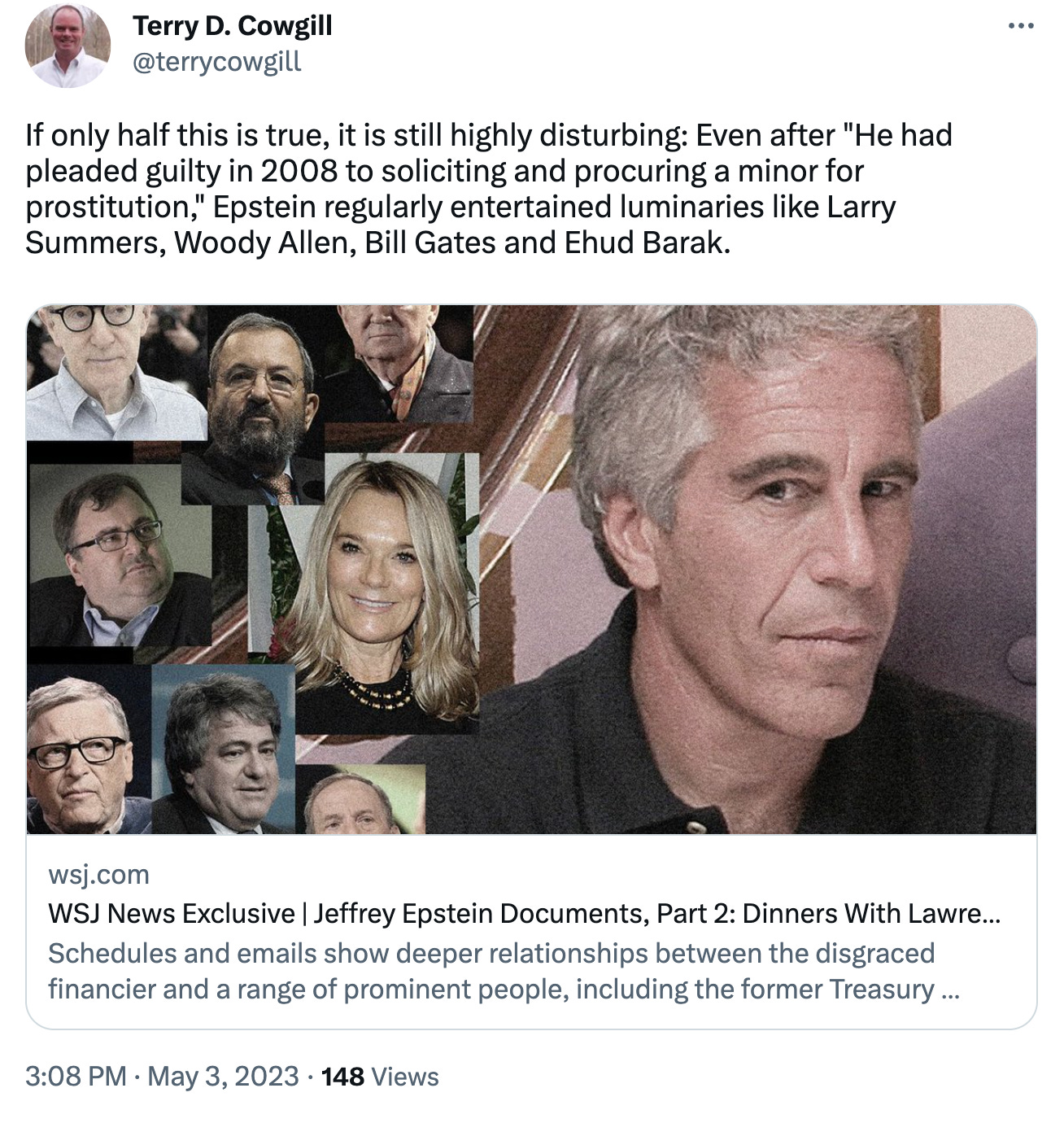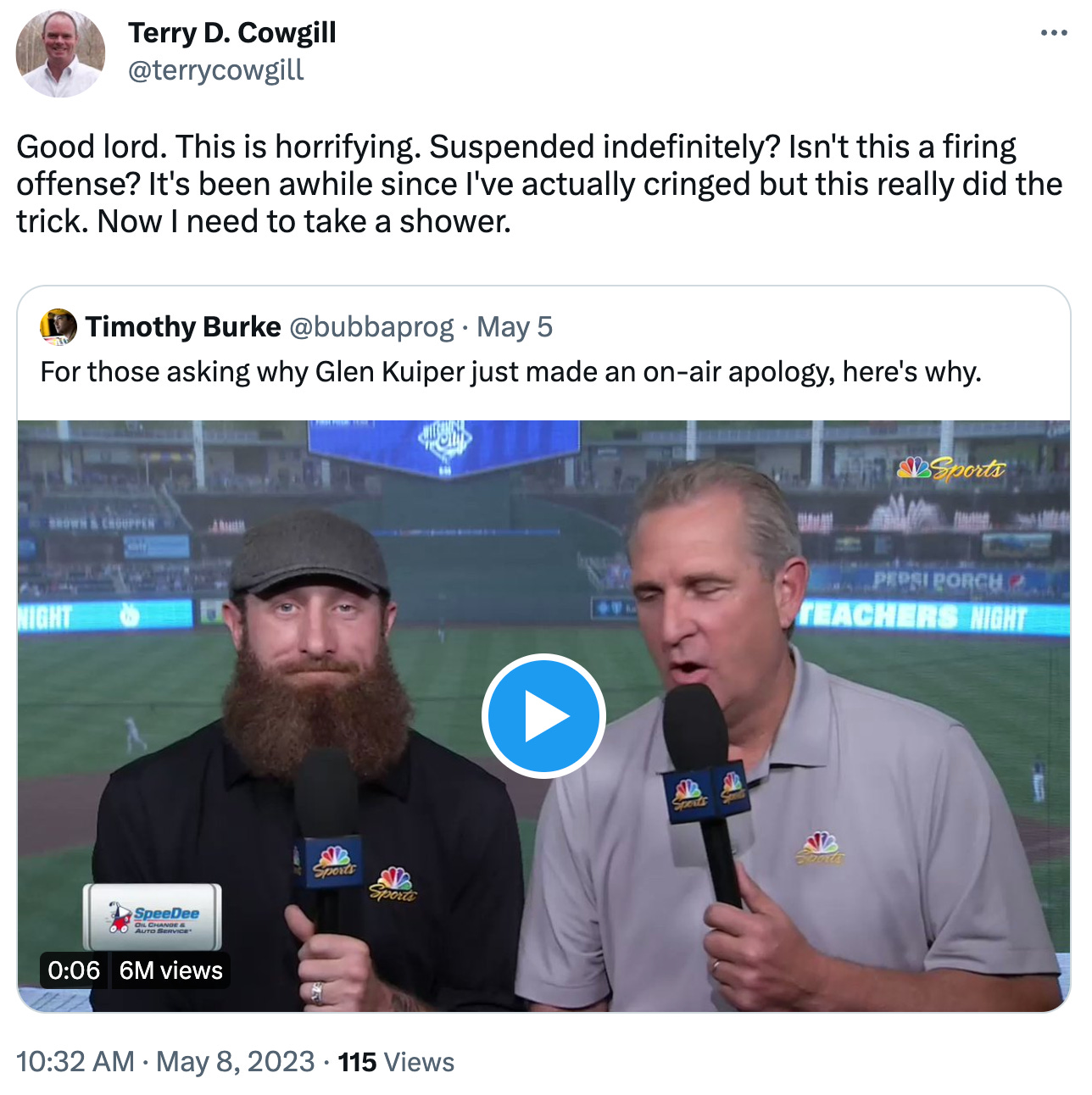
Amid the ongoing rash of mass shootings (most recently in my native DFW Metroplex), Supreme Court Justice Clarence Thomas’ continuing pattern of ethical lapses and the coronation of King Charles III, a important and disturbing story has nearly been lost.
Last week, the Wall Street Journal published a blockbuster series on convicted teen sex trafficker Jeffrey Epstein. Click here for a free link to the second piece, headlined “Jeffrey Epstein Documents, Part 2: Dinners With Lawrence Summers and Movie Screenings With Woody Allen.”
As I wrote on Twitter:
Journal reporters Khadeeja Safdar and David Benoit obtained a trove of emails and schedules from 2013 to 2017 that “provide new details about the nature and frequency of Epstein’s contacts with an array of powerful people long after he was a registered sex offender.”
In at least one case, that of former treasury secretary and Harvard president Larry Summers, Epstein actually made a cash gift of $110,000 to the nonprofit of Summers’ wife. Billionaire venture capitalist Reid Hoffman, who co-founded LinkedIn, told the Journal he approached Epstein in order to raise money for MIT. It seems that Ehud Barak, the former Israeli prime minister, simply liked being around someone important and being flown around on a private jet. Others say they were just seeking advice from Epstein.
The story follows another one a few days earlier headlined “Epstein’s Private Calendar Reveals Prominent Names, Including CIA Chief, Goldman’s Top Lawyer” (free link). A third, Bill Gates, Leon Black, Thomas Pritzker: One Day in the Life of Jeffrey Epstein,” appeared on May 4 (free link). One day was especially busy for the financier and sex offender:
On Monday, Sept. 8, 2014, Jeffrey Epstein had a full calendar. He was scheduled to meet that day with Bill Gates, Thomas Pritzker, Leon Black and Mortimer Zuckerman, four of the richest men in the country …
Most of the powerful people who were willing to respond the Journal’s inquiries expressed “deep regrets” — or some variation of that phrase — about maintaining contact with Epstein after his conviction, though, predictably enough, few would say explicitly that they knew in advance of his of 2008 guilty plea of procuring a child for prostitution and of soliciting a prostitute.
I’ll follow Axios’ “smart brevity” model here and cut to the chase. I think “why it matters” is the most important question surrounding why so many high-profile, wealthy and well connected people maintained relationships with this monster.
After all, I’m sure there are some who will simply shrug at the story and wonder why they should care about this sordid tale, especially given the fact that Epstein is said to have hanged himself in his jail cell while awaiting trial on sex trafficking charges in 2019.
If you don’t feel inclined to read the reports in the Journal (which is understandable, given their length and the cringe-worthiness of the content), here is the Cliff’s Notes version below. It includes a CNBC interview with one of the reporters:
So why do the recent Epstein revelations matter? After all, he’s gone. And if you believe in the afterlife, he’s surely burning in hell, so there is a measure of rough justice here.
I think the power that discredited but influential characters such as Epstein have over other important people can be attributed mostly to one thing: access to even greater things.
I spent nine miserable years in fundraising for independent schools. If I were convinced that a character such as Epstein could help me secure a seven- or eight-figure gift for my school, would I consider meeting with him? I can’t say that I would have rejected the idea out-of-hand.
There are at least a couple of reasons — the most important of which is that such a gift could be transformative for the organization. It could literally change the lives of those who benefit from the services the school offered. Finally, giving begets giving. A major gift of that size could encourage other big donors to come out of the woodwork and boost the profile of the school to a whole new level.
Secondarily — and it pains me to say this — it would have also benefitted me as the school’s chief advancement officer. It surely would have given me great leverage in negotiating a new contract with the head of school, or it could have been the ticket to a better job at a better school for far better pay.
I can imagine myself overhearing a discussion at a board of trustees meeting: “This Cowgill guy is worth his weight in gold. We can’t let him get away!”
If I could have accomplished all of this without the fingerprints of the Epstein character on the deal, would I have considered it? Sadly, I probably would have, but I’d also like to think I would have ultimately rejected the idea out of good conscience.
There are perverse incentives in fundraising. The trick is to navigate those moral hazards and balance the needs of the organization against the imperative to adhere to the ethics of good philanthropy, as articulated by trade organizations such as the Association of Fundraising Professionals.
Clarence Thomas, again?
I’ve already written at length here about Supreme Court Clarence Thomas’ ethical problems and am not going to do so extensively here today. But it’s safe to say that it’s no longer a one-off. Thomas has committed a series of ethical blunders that cast serious doubt about his fitness to continue to serve on the highest court in the land. I think he should resign or be impeached, but thats’s simply not going to happen.
For my CTNewsJunkie column this week, I’m going to examine the U.S. Supreme Court’s lack of ethical rules and compare it to the ethical standards other federal and state judges, including those in Connecticut, must adhere to. Stay tuned.
‘People with uteruses’
Finally, speaking of CTNJ, I happened to notice this odd story concerning my grad school alma mater, Wesleyan University in Middletown, Connecticut. The Wesleyan Democratic Socialists have obtained a commitment from the university to cover the costs of abortion services for all of its students. Fair enough. It’s a private university and it can spend its money any way it wants to.
Here is part of a statement from the Wesleyan Democratic Socialists:
Although Wesleyan is located in a state which protects the right to abortion, the renewed focus on reproductive care has illustrated the ways in which the University could better provide accessible care to people with uteruses. [emphasis added]
Perhaps someone could explain the term “people with uteruses” to me. I’ve seen variations of this gender-neutral term before. And I understand the need to be inclusive in our use of language, particularly around gender. But the last time I checked, only women can have uteruses, conceive and give birth. Does the term protect the feelings of a person who was born female but identifies as a man, had vaginal sex with another man and then got pregnant?
Please advise …
P.S. Was this video as shocking to you as it was to me? Is an indefinite suspension enough or is this an automatic firing offense?






I remain unconvinced. https://www.nih.gov/nih-style-guide/inclusive-gender-neutral-language
My dear Mr. Cowgill,
As to the line in your column regarding "that Cowgill guy is worth his weight in gold..." As a keen observer of your teaching career, I can assure you that at least some Heads of School and Trustees did,in fact, feel exactly that way.